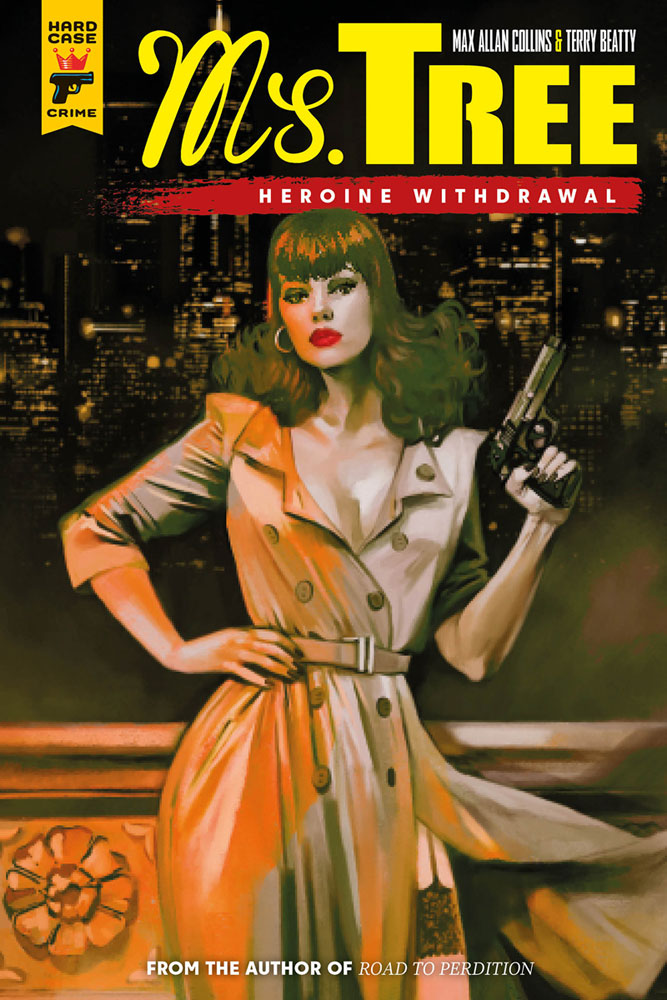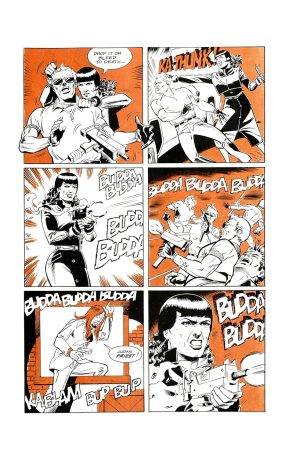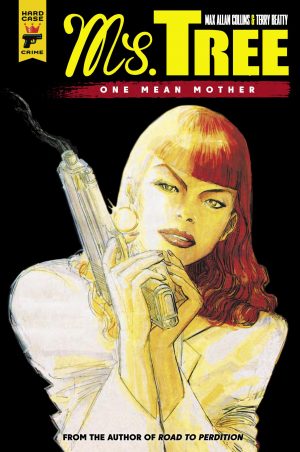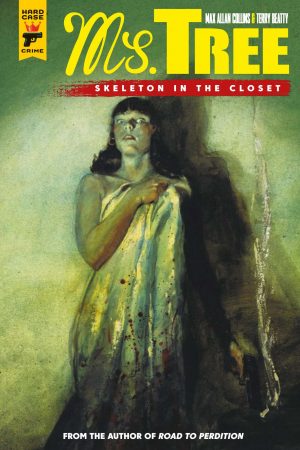Review by Frank Plowright
Another hefty slab of violent investigations featuring the tough as nails Michael Tree picks up shortly after Deadline’s brutal conclusion. Max Allan Collins throws in an early discussion of Ms. Tree’s lack of conscience when it comes to killing, and her defence being that she only kills murderers sounds suspiciously like the Punisher, while a later shootout also resembles his methods. The accusations are part of an opening story in which gangster Dominic Muerta’s trial is due.
‘Muerta Means Death’ occupies around a third of the book, as a gang war breaks out in the wake of a vacancy at the top. It’s the usual adroitly plotted mystery, but in Heroine Withdrawal it’s the exception as the stories are less about solving mysteries and more about investigating Ms. Tree’s personality. It’s clever in many respects, but hinges on someone Ms. Tree knows very well being able to fool her with some cosmetic changes. It lacks authenticity, even when bolstered in the next story by her not recognising someone who worked with her late husband.
As on the entire series Terry Beatty’s art is strong on expression and clarity, but he never convinces when people are moving. In mystery stories, though, the action is brief and the conversations are long, so Beatty’s work is generally fine. As in the previous volume the stories continue to be printed in black, white and one varying additional colour, which is unusual to see in the 21st century.
Having included one scene likely to offend the religious, for his second story Collins features a radical anti-abortion group, with the tactics they use providing the background to a tale with well planted twists. It sets up the jailing of Ms. Tree for revoking her bail conditions, and given her abrasive personality, no regular reader will expect her to settle in smoothly. It’s Beatty’s best work in Heroine Withdrawal, which is down to greater than usual use of shadow and lighting. It’s another story where greater sensitivity would now be considered, here around the language used, probably toning down a realistic depiction from Collins. It’s good, but the ending is too rapid.
Hanging over much of the volume is Ms. Tree’s forthcoming murder trial, where for once a plea of self-defence is invalid, so it’s agreed she’ll undertake voluntary psychiatric assessment. It’s a well written piece. Collins ensures we see how in this situation Ms. Tree is her own worst enemy, and for the first time reveals much about her past and how she views herself. It’s combined with a fellow inmate claiming he once saw a senator murder a woman, a story the agency staff investigate. That inmate is also responsible for some appealing Will Eisner style whimsy. There’s a smart twist to the continuation, which occurs a couple of months later and is told in turn from the viewpoints of the supporting cast with the mystery being Ms. Tree’s personality change, yet the full dose of brutality is present, and it’s more shocking for being personalised.
It’s not as if Collins has ignored personalities before, but his focus has been on the structure of complex mysteries where only surface character is necessary. Here personalities and viewpoints are more important, although there’s little realism about Ms. Tree’s relationship with her adopted son, who remains a manipulative plot device. Uncertainty and insight, though, raise Heroine Withdrawal slightly above earlier collections. The series concludes with Fallen Tree.





